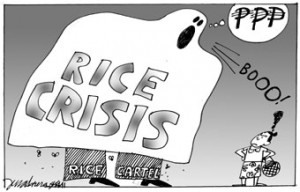Tree of injustice
THE POOR, the Gospels remind us, “you will always have with you.” If this admonition is true, it must be partly because of the unfortunate consequences of Supreme Court decisions like the most recent one on the coconut levy, recognizing Eduardo Cojuangco Jr. as the legitimate owner of a block of shares equivalent to one-fifth of giant San Miguel Corp. Strip the long-running legal struggle to its basics, and we get the grim reality: the coconut farmers who paid the levy at the height of the martial law era, from 1972 to 1982, find themselves victims all over again.
 The best thing that can be said about the decision, backed by a majority of seven justices and written by Justice Lucas Bersamin, is that it set out to do what it promised in the ruling’s first paragraph. “For over two decades, the issue of whether the sequestered sizable block of shares representing 20% of the outstanding capital stock of San Miguel Corporation (SMC) at the time of acquisition belonged to their registered owners or to the coconut farmers has remained unresolved. Through this decision, the Court aims to finally resolve the issue and terminate the uncertainty that has plagued that sizable block of shares since then.” Despite the Court’s recent adventures in flip-flopping, it is difficult to imagine the April 12 ruling, which essentially upheld a 2007 Sandiganbayan decision, suffering a reversal. It has been a very long legal road for the coconut farmers; unfortunately they have come to the bitter, frustrating end.
The best thing that can be said about the decision, backed by a majority of seven justices and written by Justice Lucas Bersamin, is that it set out to do what it promised in the ruling’s first paragraph. “For over two decades, the issue of whether the sequestered sizable block of shares representing 20% of the outstanding capital stock of San Miguel Corporation (SMC) at the time of acquisition belonged to their registered owners or to the coconut farmers has remained unresolved. Through this decision, the Court aims to finally resolve the issue and terminate the uncertainty that has plagued that sizable block of shares since then.” Despite the Court’s recent adventures in flip-flopping, it is difficult to imagine the April 12 ruling, which essentially upheld a 2007 Sandiganbayan decision, suffering a reversal. It has been a very long legal road for the coconut farmers; unfortunately they have come to the bitter, frustrating end.
As in other crucial cases of the last few years, the true measure of justice can be found in the dissenting opinion of Justice Conchita Carpio Morales. In this particular case (actually, three consolidated petitions), Carpio Morales presents a comprehensive overview of the case, offers a masterly analysis of the issues at stake—and proposes an unflinching conclusion:
Article continues after this advertisement“In sum, since at the time of the purchase of the subject SMC shares, Cojuangco, a trusted close associate of former President Marcos, was a director and corporate officer of the PCA [Philippine Coconut Authority] and UCPB [United Coconut Planters Bank], hence, he was considered a fiduciary of the coconut levy funds, its derivatives and assets, which are public in character being administered by said entities. His use for his personal benefit [emphasis in the original decision] of the very same funds entrusted to him, which was released to him through illegal and improper machination of loan transactions, and his contravention of the then existing corporation laws and laws restricting a bank’s exposure to its director or officers indicate a clear violation of such fiduciary duty. These shares which respondents acquired using the proceeds from such loans do not thus pertain to them but to the UCPB and the CIIF [Coconut Industry Investment Fund] Oil Mills pursuant to a constructive trust, and following Section 31 of the Corporation Code, said shares should be reconveyed to the Republic in trust for the coconut farmers.”
As far as we can figure it out, the majority ruling depends on a misappreciation, placing the responsibility to prove that Cojuangco et al. used monies other than the loans they admitted they had secured from CIIF Oil Mills and UCPB squarely on the shoulders of the government (represented by the Presidential Commission on Good Government). But as Carpio Morales points out, this is a fundamental mistake—“the bottom line remains the same: the burden of evidence that there were other loans that partly funded the purchase of the SMC shares was borne by Cojuangco, et al., failing which is fatal to them.”
The point couldn’t be clearer. Using the Supreme Court’s previous decisions on various cases involving the coconut levy, we can trace the main line of the coconut farmers’ argument: The levy funds created the CIIF Oil Mills and UCPB. On their own admission, Cojuangco et al. said they bought the SMC shares using “proceeds of loans” from CIIF Oil Mills and UCPB. “Undeniably, the subject SMC shares can be inescapably treated as fruits of funds that are prima facie public in character,” Carpio Morales writes. But Cojuangco et al. failed to disprove the public character of the funds they used to purchase SMC. Therefore the 20 percent block of shares rightfully belongs to the farmers who tend the so-called tree of life, those who actually paid the levy.
Article continues after this advertisementThis is the historical truth. What a great pity the new ruling doesn’t reflect it.
















